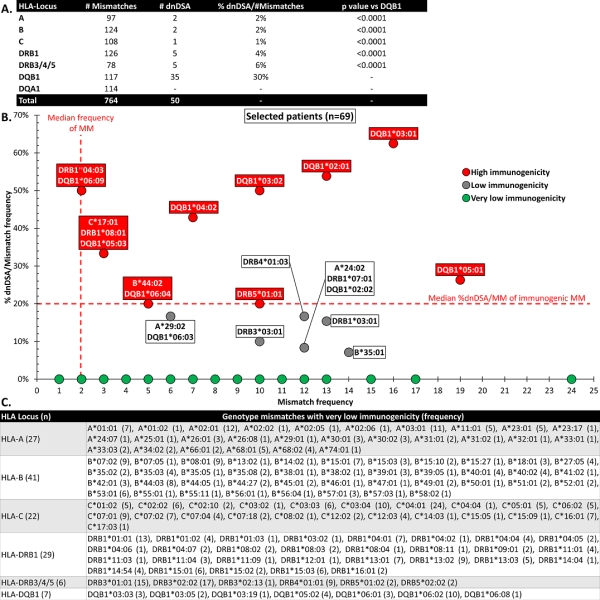The Relative Immunogenicity of HLA Mismatches in Adult Liver Transplant Recipients
1Terasaki Research Institute, Los Angeles, CA
2University of Pennsylvania, Philadelphia, PA
3Immune Tolerance Network, Seattle, WA.
Meeting: 2018 American Transplant Congress
Abstract number: A443
Keywords: HLA antigens, Immunogenicity, Liver transplantation
Session Information
Session Name: Poster Session A: Tolerance: Clinical Studies
Session Type: Poster Session
Date: Saturday, June 2, 2018
Session Time: 5:30pm-7:30pm
 Presentation Time: 5:30pm-7:30pm
Presentation Time: 5:30pm-7:30pm
Location: Hall 4EF
Determining the immunogenicity of HLA mismatches (MM) may help preventing the appearance of de novo DSA (dnDSA) and avoiding antibody-mediated injuries.
We studied the development of dnDSA against the HLA-A, -B, -C, -DR and -DQ MM (high resolution) in a cohort of 69 liver transplant patients from the A-WISH trial, which was designed to determine the clinical benefit of early immunosuppression (IS) withdrawal.
A total of 764 MM were studied. DQB1 MM were significantly more immunogenic than MM from other loci (p<0.0001, Figure 1A). No dnDSA were clearly against DQA1. Forty percent of dnDSA onset was during IS maintenance, and 60% during IS minimization/withdrawal. Among HLA-DQ MM, DQB1*03:01 was the most immunogenic where 63% MM led to the formation of dnDSA, followed by DQB1*02:01 (54%), DQB1*03:02 (50%), DQB1*06:09 (50%), DQB1*04:02 (43%), DQB1*05:03 (33%), DQB1*05:01 (26%), DQB1*06:04 (20%), DQB1*06:03 (17%), and DQB1*02:02 (8%). Among HLA-DR MM, the immunogenicity was highest for DRB1*04:03 (50%), followed by DRB1*08:01 (33%), DRB5*01:01 (20%), DRB4*01:03 (17%), DRB1*03:01 (15%), DRB3*03:01 (10%), and DRB1*07:01 (8%). Last, among HLA-I MM, the immunogenicity was highest for C*17:01 (33%), followed by B*44:02 (20%), A*29:02 (17%), A*24:02 (8%), and B*35:01 (7%) (Figure 1B). A great number of MM did not lead to the formation of dnDSA despite the high frequency of some in the cohort (Figure 1C).
HLA-DQ MM are the most immunogenic compared to MM from other HLA loci. Highly immunogenic MM (upper-left quadrant in Figure 1B) should be considered to prevent the development of dnDSA and antibody mediated graft injury. Many MM did not induce dnDSA and are not likely to be immunogenic, hence these MM may be considered permissible. 
CITATION INFORMATION: Jucaud V., Shaked A., DesMarais M., Sayre P., Everly M. The Relative Immunogenicity of HLA Mismatches in Adult Liver Transplant Recipients Am J Transplant. 2017;17 (suppl 3).
To cite this abstract in AMA style:
Jucaud V, Shaked A, DesMarais M, Sayre P, Everly M. The Relative Immunogenicity of HLA Mismatches in Adult Liver Transplant Recipients [abstract]. https://atcmeetingabstracts.com/abstract/the-relative-immunogenicity-of-hla-mismatches-in-adult-liver-transplant-recipients/. Accessed July 18, 2025.« Back to 2018 American Transplant Congress
